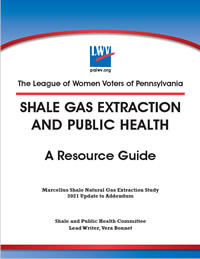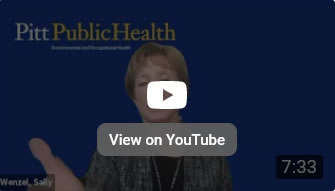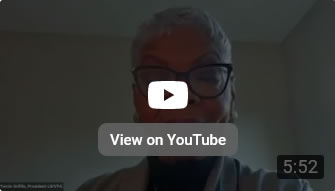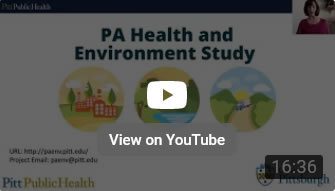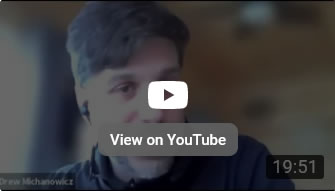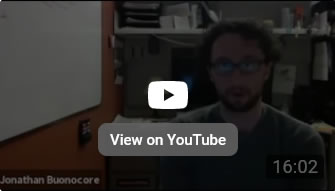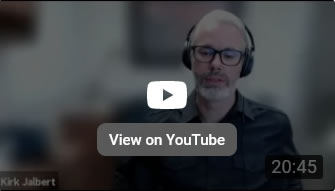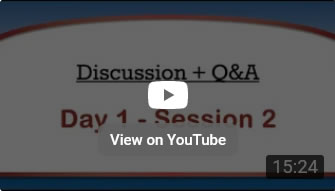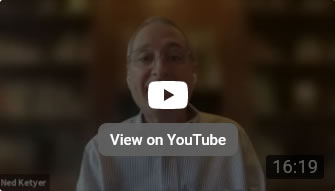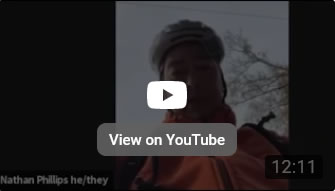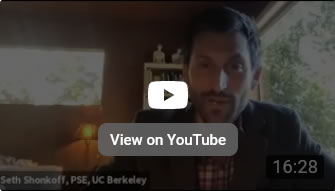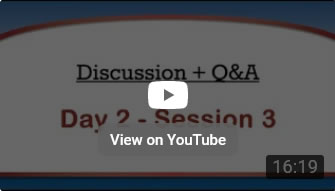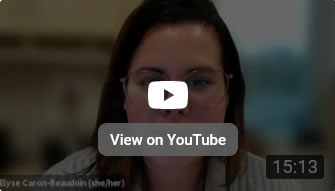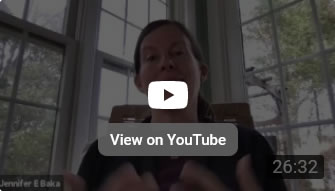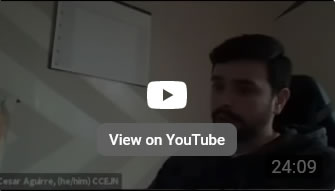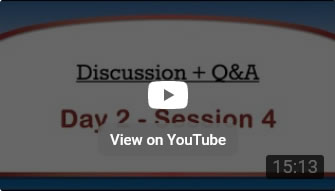The Straight Scoop on Shale
Sponsored by the League of Women Voters of Pennsylvania
2021 Shale & Public Health Conference
The ninth annual Shale & Public Health Conference took place as an online conference over two days
Tuesday, November 16 & Wednesday, November 17, 2021
New research presented by national experts on shale and public health impacts, and practical applications.
We would love to hear from you!
Please fill out the conference evaluation form. Thank you!
The video recordings of the 9th Annual Shale & Public Health Conference are now available on YouTube. Select individual videos below or see the entire Playlist on YouTube.
Need Print Editions of the Guide?
If you would like a free hard copy (or copies), please fill out the form below (all fields required)
Opening Remarks – Day 1
Sally Wetzel, MD, Chair, Occupational and Environmental Health, University of Pittsburgh Graduate School of Public Health
Day 1
New Health Research
Perspectives on Exposures
Nicole C. Deziel, PhD MHS, Associate Professor Yale School of Public Health
Session 2: Research and Regulatory Policy
Setbacks
Drew Michanowicz, DrPH, MPH, CPH, Senior Scientist || PSE Healthy Energy Visiting Scientist || C-CHANGE, Harvard T. H. Chan School of Public Health
Day 2
Session 3: Emerging and Urgent
PFAS “Forever Chemicals” and Fracking
Edward C. Ketyer, MD, FAAP, President of Physicians for Social Responsibility Pennsylvania
Session 4: Community Voices
Community Based Research, Birth Outcomes, Indigenous Populations and Fracking
Élyse Caron-Beaudoin, PhD, MSc, University of Toronto Scarborough
Engaging community perspectives in studying the ethane cracker in Southwestern Pennsylvania
Jennifer Baka, PhD, Penn State
Program & Speaker Introduction
Day One – Tuesday November 16
Welcome – Sally Wetzel, MD, Chair, Occupational and Environmental Health, University of Pittsburgh Graduate School of Public Health
Session 1: New Health Research
Perspectives on Exposures
Nicole C. Deziel, PhD MHS, Associate Professor Yale School of Public Health
Dr. Nicole Deziel is an Associate Professor in Environmental Health Sciences at the Yale School of Public Health and a member of the Yale Cancer Center and Yale Center for Perinatal, Pediatric and Environmental Epidemiology. Over the past 15 years, her research has involved applying existing and advanced statistical models, biomonitoring techniques, and environmental measurements to provide comprehensive and quantitative assessments of exposure to combinations of traditional and emerging environmental contaminants. Dr. Deziel’s work involves the use of large administrative datasets in conjunction with detailed field-based studies. She is also leading an inter-disciplinary team of investigators on a project entitled “Drinking water vulnerability and neonatal health outcomes in relation to oil and gas production in the Appalachian Basin,” which is evaluating whether exposure to water contaminants from the process of hydraulic fracturing is associated with adverse human developmental and teratogenic effects. Dr. Deziel serves as Associate Editor for the Journal of Exposure Science and Environmental Epidemiology and is on the Editorial Board of Environment International. She is also a member of the National Academies of Sciences Standing Committee on the Use of Emerging Science for Environmental Health Decisions.
Texas Birth Outcomes
Mary D. Willis, PhD MPH, Oregon State
Dr. Mary D. Willis is a postdoctoral research scholar at Oregon State University. Her work examines the influence of environmental hazards on reproductive health. She specifically focuses how complex industrial exposures affect local communities and how epidemiology can inform effective policy decisions to improve population health.
Methodological considerations in the conduct of childhood case-control studies
Evelyn O Talbott, Dr PH, MPH, Professor, Department of Epidemiology, University of Pittsburgh
As an environmental and cardiovascular epidemiologist with more than 30 years of experience, my work has centered upon both case control as well as cohort studies of the health effects in populations exposed to personal or environmental risk factors such as air pollution and toxicants. From 2005 until 2014 I was the director of the Academic Center for Excellence in Environmental Public Health Tracking at the University of Pittsburgh, one of five academic institutions tasked with assisting CDC in forming their Environmental Public Health Tracking Network (EPHTN). For the past 25 years I have been the program director of the Environmental Epidemiology program and have mentored over 75 doctoral and masters’ students in this area. I am the director of the Environmental Epidemiology program in the department, and was one of the founding members of ISEE, the International Society for Environmental Epidemiology serving as its Secretary-Treasurer for four years
Session 2: Research and Regulatory Policy
Setbacks
Drew Michanowicz, DrPH, MPH, CPH, Senior Scientist || PSE Healthy Energy Visiting Scientist || C-CHANGE, Harvard T. H. Chan School of Public Health
Dr. Drew Michanowicz is a Senior Scientist at PSE Health Energy and visiting scientist with the Center for Climate, Health, and Global Environment (C-CHANGE) at the Harvard T. H. Chan School of Public Health. Trained in environmental and occupational health, his research centers on the poorly communicated human health and safety costs of our present and future energy choices. He has extensive experience in indoor and atmospheric air pollution monitoring and exposure research with applications to both urban settings and natural gas development. In 2008, he co-developed FracTracker – a geoweb-based tool designed to facilitate public engagement around emerging shale gas extraction in PA. More recently, his research has focused on hazards posed by midstream and downstream systems of the natural gas supply chain as well as impacts to end user indoor air quality. Dr. Michanowicz is a nationally board-certified public health practitioner and received both a Master’s and Doctorate of Public Health from the University of Pittsburgh Graduate School of Public Health. In 2015, Dr. Michanowicz was awarded the NatureNet Science Fellowship with the Nature Conservancy and he completed his postdoctoral work in the Environmental Health Department at the Harvard T. H. Chan School of Public Health.
Methane Policy and Health
Jonathan J Buonocore, ScD Research Scientist Harvard C-Change
Jonathan Buonocore Sc.D. evaluates the health, environmental, and climate benefits and impacts of energy choices and climate change mitigation methods. Currently, he is researching air pollution from oil and gas development in the United States, climate policies for the transportation sector in the Northeast U.S., building electrification, and possible health impacts of stratospheric aerosol injection – an intervention intended to mitigate climate change by reflecting sunlight.
Previously, he has evaluated the health “co-benefits” of a number of climate policies, including options for nationwide power plant carbon standards in the United States, a carbon price in Massachusetts, and expansion of onshore and offshore wind energy, solar energy, and energy efficiency programs in the U.S. He has also applied these methods to financial investment portfolios, green buildings, forest fires in Indonesia, and worked on health impact assessments of transportation policies in the greater Boston area.
Pipelines, Easements, and Landowner Surveys
Kirk Jalbert, PhD, Assistant Professor, School for the Future of Innovation in Society, Arizona State University
Dr. Kirk Jalbert is an Assistant Professor in the School for the Future of Innovation in Society in Arizona State University’s College of Global Futures. Dr. Jalbert directs the Civic Science for Environmental Futures Collaborative, a lab focused on generating participatory research projects that create equitable and just environment futures. His research examines how public participation in environmental governance are shaped by uses of data, monitoring tools, and community-science projects. His work additionally examines how the public assesses the environmental and public health risks of petrochemical development projects. This work is done in service of understanding how environmental justice coalitions seek to mitigate disproportionate harms and seek greater opportunity to shape regulatory policies. Prior to his current position at ASU, Dr. Jalbert served as Manager of Community-Based Research and Engagement for the national nonprofit FracTracker Alliance, organizing energy justice data transparency and mapping projects. Dr. Jalbert additionally served on the Pennsylvania Department of Environmental Protection’s Environmental Justice Advisory Board from 2016-2018.
Day Two – Wednesday November 17
Welcome – Terrie Griffin, DMin, MHS, President League of Women Voters of PA
Session 3: Emerging and Urgent
PFAS “Forever Chemicals” and Fracking
Edward C. Ketyer, MD, FAAP, President of Physicians for Social Responsibility Pennsylvania
Dr. Ned Ketyer is a Pittsburgh, Pennsylvania-area pediatrician. Dr. Ketyer enjoyed 26 years in private practice before retiring from patient care in 2017, although he continues to write a daily blog for his pediatric practice called The PediaBlog (www.thepediablog.com). He remains a member of the American Academy of Pediatrics Council on Environmental Health and Climate Change and is President of Physicians for Social Responsibility. Dr. Ketyer is a consultant for the Southwest Pennsylvania Environmental Health Project bringing attention to the health impacts of fracking in the Marcellus Shale gas patch.
Dr. Ketyer’s work connects the rapid expansion of shale gas extraction (fracking) and petrochemical development (plastics) in the Ohio River Valley with the local and regional health impacts currently experienced by residents, and the global ecologic and public health catastrophes resulting from plastic pollution and climate change that threaten the health and well-being of all passengers on this shining ball of blue.
Dust Suppressants
Audrey Stallworth, EIT
Audrey Stallworth graduated from Ohio State University in 2017 with a BS in Environmental Engineering and a minor in Environment, Economy, Development and Sustainability, and from Penn State University in 2019 with an MS in Environmental Engineering. Her master’s thesis research focused on evaluating the performance of oil and gas produced water as a dust suppressant on dirt and gravel roads. This work was recently published in the Transportation Research Record (TRR) and in Science of the Total Environment (STOTEN). In college, she completed internships in both the public and private sectors. Audrey currently works as an environmental consultant and is working towards getting her PE. In her free time, she enjoys cooking, hiking, and crocheting.
Oil and Gas Produced Water
Nathaniel Warner, PhD, Assistant Professor Penn State
Nathaniel Warner is an Assistant Professor at The Pennsylvania State University in the Civil and Environmental Engineering Department. Dr. Warner received his PhD in Earth and Ocean Sciences from Duke University. His research focuses on understanding the processes controlling sources of salts in shallow groundwater and surface water using inorganic isotope tracers. Dr. Warner also investigates novel treatment technologies to remove radioactivity from high salinity waters such as oil and gas produced water.
Climate Change across the Fracking Process Chain
Nathan Phillips, PhD, Professor Boston University
I am a physiological ecologist who studies land-climate interactions in terrestrial ecosystems and human-dominated environments, including exchanges of energy, water, and greenhouse gases including methane and carbon dioxide exchanged between the air and leaves, soil, buildings, humans, and pipelines. I work with advocates, community members and policymakers to apply my research to advance sustainable communities and a habitable planet.
Methane Research
Seth B. C. Shonkoff, PhD, MPH, Executive Director, PSE Healthy Energy
Dr. Seth Shonkoff is the executive director of the energy science and policy research institute, PSE Healthy Energy. He is also a visiting scholar in the Department of Environmental Science, Policy and Management at the University of California, Berkeley and an affiliate in the Environment Energy Technology Area at Lawrence Berkeley National Lab. An environmental and public health scientist by training, he has more than 20 years of experience in water, air, climate, and population health research at the energy interface and has published more than 50 peer-reviewed journal articles and reports. Dr. Shonkoff is a widely recognized expert on the human health and climate dimensions of oil and gas systems. He has testified before Congress and other decision-making bodies and has led and co-authored multiple high-profile scientific assessments. His work includes the Human Health chapter of The Intergovernmental Panel on Climate Change (IPCC) Fifth Assessment Report (AR5) and legislated evaluations of oil and gas development, hydraulic fracturing, produced water management and reuse and underground gas storage facilities in the State of California. Dr. Shonkoff sits on a number of science-policy expert panels. Dr. Shonkoff completed his PhD in the Department of Environmental Science, Policy, and Management and his MPH in epidemiology in the School of Public Health from the University of California, Berkeley.
Session 4: Community Voices
Community Based Research, Birth Outcomes, Indigenous Populations and Fracking
Élyse Caron-Beaudoin, PhD, MSc, University of Toronto Scarborough
Élyse Caron-Beaudoin is an Assistant Professor in environmental health in the Department of Health and Society at the University of Toronto Scarborough. Her research is focused on the development of transdisciplinary community-based research projects to assess the impacts of anthropogenic pressures on health by combining information from multiple levels of biological organization. Élyse holds a PhD in biology with a specialization in toxicology from the Institut National de la Recherche Scientifique – Armand-Frappier Institute in Laval, Quebec. From 2018 to 2020, she completed a Canadian Institutes of Health Research Postdoctoral Fellowship in the Department of Occupational and Environmental Health at the Université de Montreal. During her fellowship, Dr. Caron-Beaudoin investigated the associations between density and proximity to hydraulic fracturing wells and birth outcomes in Northeastern British Columbia. She is currently investigating gestational exposure to environmental contaminants associated with unconventional natural gas exploitation and their endocrine disrupting potential. She is a collaborator and co-investigator on several other research projects in environmental and Indigenous health, including in the Arctic.
Engaging community perspectives in studying the ethane cracker in Southwestern Pennsylvania
Jennifer Baka, PhD, Penn State
Jennifer Baka is an Assistant Professor of Geography at Penn State. She conducts interdisciplinary research on energy policy using research methods from political ecology, industrial ecology and resource geography. For nearly a decade, Dr. Baka researched international biofuel policies, primarily in India. More recently, she has been examining unconventional energy policy in the US. Prior to joining Penn State, she was an Assistant Professor of Geography and Environment at the London School of Economics from 2013-16. She earned a PhD in Environmental Studies from the Yale School of Forestry and Environmental Studies and a Master’s in Public Policy from UC Berkeley. Prior to graduate school, Dr. Baka worked in the energy industry for numerous years first as an economic consultant in Washington, DC and second as a consultant for the United Nations Environment Programme in Paris, France.
Community Participatory Research
Cesar Aguirre, Senior Community Organizer, Central California Environmental Justice Network (CCEJN)
As a child in a family of migrant farm workers who turned into community organizers, Cesar was exposed to community organizing and advocacy at an early age. Since starting with CCEJN, Cesar works in rural communities in Kern County helping fenceline communities affected by oil and gas and pesticides understand how to protect themselves from these sources of pollution and how to advocate for systemic changes that prioritize their health. Cesar has participated in multiple projects (i.e. Arvin Air Quality; I.M.P.R.O.V.E) where he has trained residents on how fracking and other activities related to the oil and gas industry are negatively impacting their neighborhoods. He has also trained community members on the collection of data using PM monitors and bucket samples.

